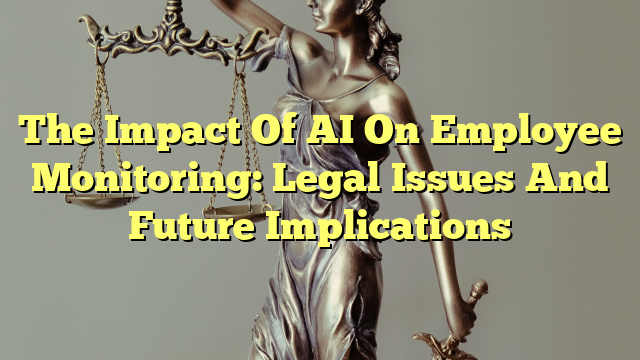Table of Contents
Legal Implications of AI in the Workplace
Artificial Intelligence (AI) has become increasingly prevalent in the workplace, raising several legal implications. One major concern is the potential invasion of employee privacy. AI systems can collect and analyze vast amounts of data, including personal information, which may infringe upon an individual’s right to privacy.
Employers must ensure that they comply with data protection regulations and obtain appropriate consent from employees before implementing AI systems that monitor their activities.
Additionally, AI algorithms may introduce bias and discrimination in decision-making processes, such as hiring and promotion. Employers must be aware of these risks and take steps to mitigate them to ensure fair and equal treatment of employees.
Future of Work and AI
The integration of AI in the workplace is expected to significantly impact the future of work. While AI has the potential to automate repetitive tasks and increase efficiency, it may also lead to job displacement and changes in job roles.
Employers must navigate the legal implications of workforce restructuring and ensure that employees are treated fairly during the transition. This may involve retraining programs, redeployment opportunities, or providing adequate compensation for those affected by job loss.
Legal Issues Arising from AI
AI systems raise several legal issues, including liability and accountability. If an AI system makes a decision that results in harm, who should be held responsible? Should it be the developer, the employer, or the AI system itself?
Regulatory frameworks need to be established to address these issues and ensure that individuals are protected from potential harm caused by AI systems. This may involve creating guidelines for AI development and usage, as well as defining legal standards for accountability.
Legal Challenges in Performance Monitoring
The use of AI in performance monitoring can present legal challenges. While AI systems can provide valuable insights into employee performance, they may also infringe upon an individual’s right to privacy and create a hostile work environment.
Employers must strike a balance between monitoring employee performance and respecting their privacy rights. Clear policies and guidelines should be established to ensure that AI systems are used in a fair and transparent manner.
Legal Challenges in Performance Ratings
AI systems can also impact performance ratings, potentially introducing bias and discrimination. If AI algorithms are not properly trained or validated, they may unfairly assess employees based on factors unrelated to their performance.
Employers must ensure that performance rating systems are transparent and unbiased. Regular audits and reviews should be conducted to identify and address any potential issues with the AI algorithms used in performance evaluations.
Conclusion
The integration of AI in the workplace brings both opportunities and challenges. Employers must navigate the legal implications of AI systems, ensuring that they comply with privacy regulations, mitigate bias and discrimination, and address potential legal issues arising from the use of AI in performance monitoring and ratings.
By proactively addressing these legal challenges, employers can harness the benefits of AI while protecting the rights and well-being of their employees.


AI brings new legal issues for employers to consider when it comes to employee monitoring in the future.